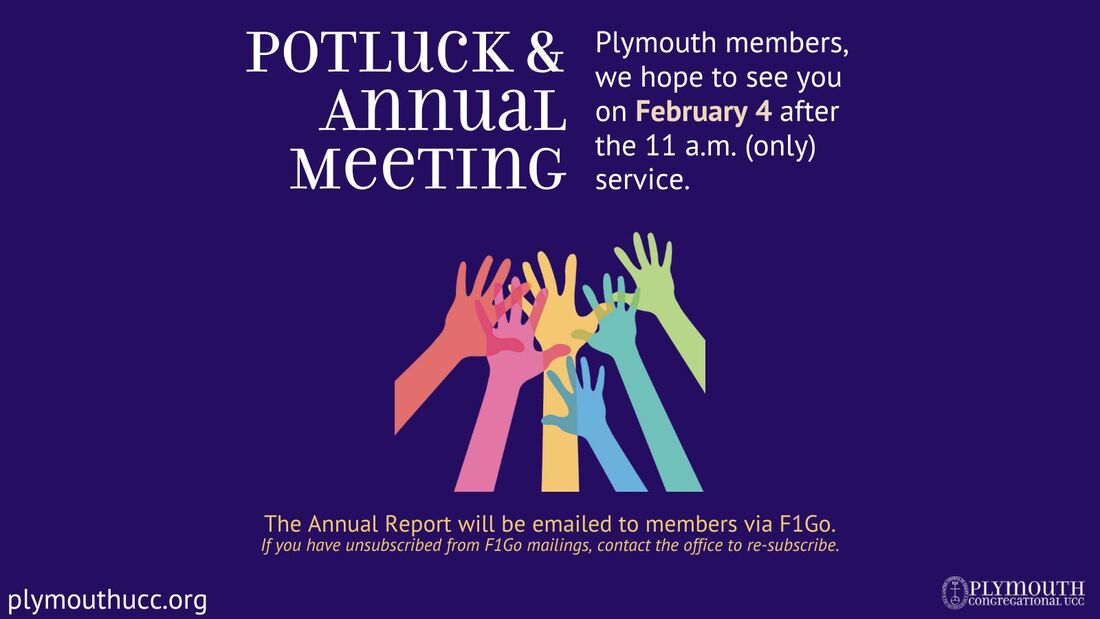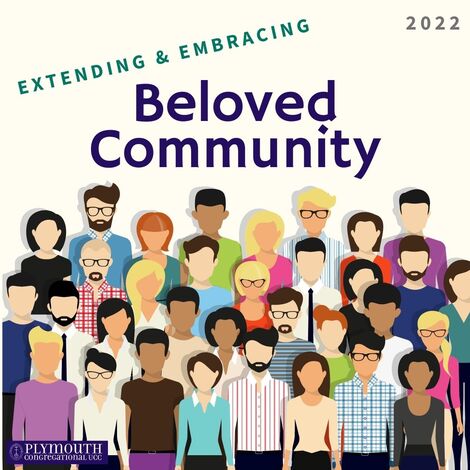|
Change and new life seem to be everywhere this time of year, as we celebrate Easter and as the long Colorado winter finally gives way to spring. Plymouth is also entering a period of transformation! Some of these changes involve our physical infrastructure. In the coming weeks, you’ll see crews at work installing a new sloped roof above the Fellowship Hall and Fireside Room. Leaks and standing water on our current flat roof have been a problem for decades, so I’m thrilled that we’re finally able to address this critical need. Your Leadership Council anticipates funding this project by drawing on our reserves, with no need to take out a loan. Over the coming weeks, a small team of members will also be working to identify other areas where our facility could better support our community—and embody our values—with the goal of launching a capital campaign later this year to fund priority improvements and replenish our reserves. Stay tuned! Accompanying these physical changes, ministry at Plymouth is also entering a period of transition, as Hal prepares to retire after 21 years as Plymouth’s senior minister. Like many others, I find myself experiencing a range of emotions, including sadness at the loss Hal’s departure will be for Plymouth, as well as hope for new beginnings in the years to come. Leadership Council’s first step in navigating this process will be to meet with acting Rocky Mountain Conference minister Erin Gilmore to learn about what other congregations in our region have been doing and what resources are available to us. I don’t yet know what this process will look like beyond that, but I do know that we are committed to being transparent and intentional, so expect to hear lots more as we move forward. I’m excited to see how Plymouth grows and changes in the months and years ahead! Adam Adam Redavid is not only our moderator, he’s also one of the coordinators for Plymouth Social Club, our Gen X/Millennial social group. A Colorado State University alum and staff member, Adam lives in Wellington with his husband Nic. Pronouns: he/him.
One of the truest blessings of my mornings recently has been the sunrises. For anyone who hasn’t witnessed the incredible light show each day, it is actually difficult to put into words how amazing sunrises have been. Pinks, purples, reds, yellows, blues - it is almost like God is painting with the brightest oils available. Even this morning, it took my breath away as I drove to my office in Old Town. After what felt like an eternity of freezing cold weather (which was actually only a few days), the sunrises have ushered in a renewed sense of hope for me; an assurance that winter won’t last forever and spring will certainly come.
That hope has also been with me during the last few months of being Moderator. As I've sat through Leadership Council meetings, attended the Congregational Conversation, and been a fly on the wall during other budget conversations, the news for our Church has generally been full of hope and joy. This coming weekend is our annual church meeting, where we will preview a little of what the year has in store, celebrate the volunteers who dedicated so much time and talent in 2023, and welcome those who are jumping in for 2024. We will also discuss the budget, which is probably not everyone’s favorite topic. For many, discussing money is fraught with stress and anxiety. It isn’t always comfortable to talk finances, but what I have taken away from the seemingly endless conversations that have been had, is that we are so BLESSED. We are blessed to have a congregation that is involved and cares; a congregation that asks questions and makes suggestions; a congregation that values each other. And what I ask as we approach the annual meeting is that we keep our blessings in mind. May we continue to value those who dedicate so much to our Church, and those involved in important decisions that impact Plymouth, and those who strive to understand. Because we are in this together and 2024 is going to be an amazing year! Also, who doesn’t love a church potluck? Thank you for being part of Plymouth and part of our amazing community. I look forward to seeing everyone on Sunday! Heather Heather Siegel, Plymouth's 2023 Moderator As I snuck into church on Sunday, a few minutes late, I was elated (and also a little embarrassed) as I found myself gently nudging into a spot in the front row. The pews were packed, leaving very little room for those of us who spent more than a few minutes wrangling small children. My usual spot is in the back left, so the front row was a new experience. And from my prime seat, I was struck by one of the questions for the Instant Sermon – Why go to church?
The reality is that Sunday morning is just one opportunity for us to “go to church.” A very important part of Plymouth involves Sunday worship, but that is just a blip of what Plymouth is about. As Moderator, I am the head of Leadership Council. That title may be meaningful to some, but prior to my time in this role, I didn’t even know the role of Leadership Council or Plymouth’s Moderator. What many people may not realize is that Plymouth is a seemingly endless web of opportunities to engage in “going to church.” Leadership Council oversees six boards and five committees. Each board has countless ministry teams, and on any given day, there are a handful of meetings and opportunities to help Plymouth, our community, and communities abroad. There is nothing wrong with being a back pew Plymouth member. I have quite enjoyed the many hours spent with that view. But Plymouth is so much more than Sunday mornings. Plymouth is an amazing network of volunteerism, which breathes life into our congregation. But don’t fear! – whether you just need a brief reminder of what Plymouth has going on, or if the words “boards,” “communities,” “council,” and “ministry teams” are completely foreign, now is your chance to learn and engage! On Jubilee Sunday, September 10, Plymouth is having an Involvement Fair between services. So if you’re ready to “go to church,” in a different way, please come see all the opportunities to get involved. Oh, and did I mention you could win a fresh-baked pie? Heather Siegel Moderator  Image: Skitterphoto on Pexels Image: Skitterphoto on Pexels For the Missions Marketplace in November, Anabel (age 7) wanted to contribute. She loaded up a small purse with her money and we headed off to church. Without knowing anything about money and finances, Anabel was clear that she wanted to donate her money to help others. What she really didn’t know is that all 300 of her shiny coins were only worth about $3.00. Her contribution, although small, was significant for her. She gave that money with a cheerful heart. Money is a tricky topic. People do not like talking about money because it can be uncomfortable. As a Church, though, this is a topic that won’t be going away. Our Church is thriving right now – the pews were full on Sunday, people are excited for upcoming events, and more than anything, our community wants to help others. But excitement and the desire to serve don’t pay our bills. They don’t fix the deficit in our budget. As chair of Budget and Finance last year, it was evident that unless we want to lay off our staff, we do not have money to cut out of our budget. We can reduce a little bit here and there, but ultimately, unless people step up and contribute financially, we cannot sustain our current situation. Our finances are not getting better, and it is time for Plymouth, as a community of believers, to make some changes. Not everyone has money to give to the Church, but many people do. If you love Plymouth and you want to see Plymouth continue to be a beacon of hope in an increasingly chaotic world, now is the time. Visit plymouthucc.org/give to learn more. Heather Heather Siegel 2023 Moderator As I was reflecting on what the theme and goals could be for this year, I kept coming back to the concept of working for the common good. I kept thinking about how our country has moved away from this value, particularly over the past decade or two. Surely, there are people who continue to believe and actively work to make it a reality. Wouldn’t it be nice to hold them up and celebrate their good work? I slowly moved from this phrase to express it a bit differently with Beloved Community, as expressed in our new strategic plan. You might ask as I did, what does beloved community mean and where did this phrase first originate? “Philosopher-theologian Josiah Royce, who founded the Fellowship of Reconciliation, coined the term Beloved Community in the early 20th century. It was Dr. Martin Luther King, Jr., a member of the Fellowship of Reconciliation, who popularized the term and invested it with a deeper meaning. King's Beloved Community is justice, not for any one oppressed group, but for all people. As Dr. King often said, `Injustice anywhere is a threat to justice everywhere.’ He felt that justice could not be parceled out to individuals or groups, but was the birthright of every human being in the Beloved Community.” I can see the connection between working for the common good and beloved community. Therefore, the Leadership Council has adopted the following theme for 2022 - “Extending and Embracing Beloved Community.” What an amazing difference this can make in how we interact with all people and creation. Some will say this is only a dream. They are correct unless we commit to finding the various ways, both individually and corporately, we can breathe life into reality. Leadership Council cannot do this alone. We need all of our church family to be engaged. Let us find ways to celebrate those among us who are putting this dream into action. Please reach out to me or to other Council members with names of groups or individuals we need to recognize and thank for their efforts. Peace and blessings, Claudia 2022 Moderator AuthorClaudia has been a member of Plymouth since 2006. Her volunteer jobs have included Deacon, Congregational Life Board, lead organizer of the All Church Retreat and the Women's Friendship annual retreat, and an active member of the Celtic Spirituality group. and Fellowship of the Grape (FOG) group. |
Details
|




 RSS Feed
RSS Feed